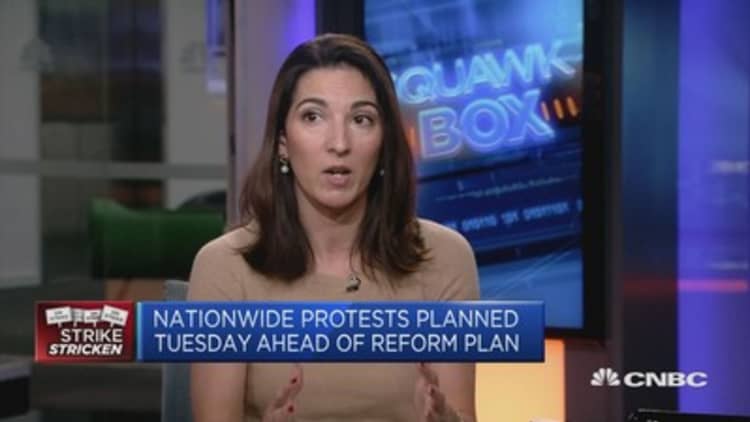French commuters experienced a chaotic journey getting to work on Monday as public sector workers entered a fifth consecutive day of nationwide strikes.
The traffic lines totaled more than 500 kilometers (310 miles) getting into the French capital Monday morning, twice as long as the usual number; the Parisian metro had only 2 out of 16 lines fully working, and the national railway company SNCF also warned against severe disruptions in the suburbs of Paris.
Nationwide, public sector workers have protested against government plans to update the pension system since Thursday. The strike has led to the closure of certain schools, cancellation of flights and a downturn in tourism and Christmas retail.
Monday starts a make-it-or-break-it week for the French government, according to different French media. The French government is due to unveil the outcome of consultations carried over the last months on Monday and to announce the final details of its pension reform plan on Wednesday.
President Emmanuel Macron vowed in 2017 to change France's pension system, which is one of the most expensive across the world, according to data from the OECD.
Macron wants to implement a single, points-based system. This would replace the current 42 different pension plans that vary according to profession and region, which means some workers are currently entitled to a full pension before the minimum retirement age of 62. The proposed system aims to make pensioners contribute the same amount and give them equal rights.
However, the public sector is against the changes arguing these would mean a later retirement age or cuts to their pensions.
France's Prime Minister Edouard Philippe said Friday that the government is not seeking a confrontation. "The application of a universal pension system guarantees to all citizens their retirement and to their children," he said on Twitter.
France's pension problem
Changing France's pension system has been a controversial subject for more than two decades. In 1995, President Jacques Chirac ended up caving into union demands after his pension reform plans faced weeks of demonstrations. Since then, no president has tried to alter the pension arrangements. The current general strike is reportedly the biggest movement of its kind since 1995.
According to the French press, the Macron government could adjust plans to look at longer transition periods or apply the new laws to those that aren't currently close to the retirement age.
"I have seen the mobilization of teachers and I understand their concerns. We promise that their pensions will not go down. There will be a progressive revaluation of their remuneration so that their purchasing power at the time of their pension does not go down," Prime Minister Edouard Philippe also said Friday.
Last year, President Macron also faced widespread protests after putting forward plans for additional diesel taxes. The so-called "Yellow Vest" movement took to the streets for several months until the government said it would be revising its plans.

Correction: The headline and text of this story has been updated to accurately reflect the lengths of traffic jams during the strike.


